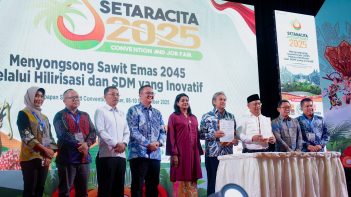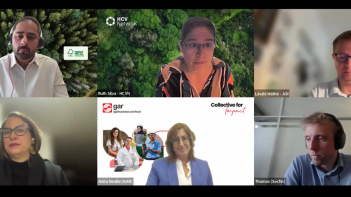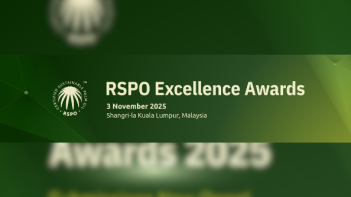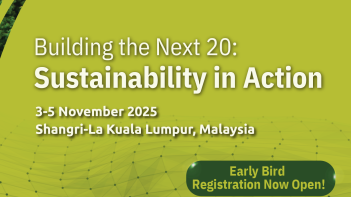Leena Ghosh joins RSPO armed with a long list of achievements in human rights development. Among these has been her pivotal role in pioneering several human rights projects as the Head of Unit for the Association of Southeast Asian Nations (ASEAN) Intergovernmental Commission on Human Rights, including issuing the first working draft of the ASEAN’s Human Rights Declaration, conceptualising the association’s integration of human rights and the environment, and the inclusion of International Human Law in the ASEAN Charter, resulting from her team’s humanitarian diplomacy work. Leena facilitated countless human rights awareness events within the ASEAN Secretariat as part of the staff’s capacity development, which eventually led her to draft the association’s Anti Sexual Harassment provisions, and incorporate accessibility considerations for Persons with Disabilities.
“I’ve always believed in leaving a mark or making a difference in human rights development wherever I am planted,” shares Leena. “Eventually, I’d like to be known as a trailblazer for human rights and social standards for RSPO as well.”
After her ASEAN stint, Leena moved to Myanmar to work as a Senior Peace Advisor to the National Peace and Reconciliation Centre (NRPC), which allowed her to hone her skills in peace architecture, peace-building, donor-finance compliance and organisational management.
A law graduate from the University of Leeds, Leena holds a Master’s Degree in Law from the University of Exeter, and eventually obtained her second Master in the Theory and Practice of Human Rights from the University of Essex as a Chevening scholar. She was a licenced barrister in three jurisdictions – Malaysia, Singapore and the United Kingdom.
What first made you interested in human rights and eventually pursuing it as a career?
I was drawn to human rights while I was still in high school because I felt deeply about human rights abuses that were happening around me, and I was compelled to do more to help the victims. During my early years in legal practice, I often committed my free time doing pro bono work, legal aid and involved myself in human rights issues. I found great satisfaction doing this work and in helping others access their rights. Since then I knew it was a calling to work on human rights full time. I eventually left legal practice to pursue my career in human rights by joining Malaysia’s National Human Rights Institution (Suhakam). There was no turning back.
Given your experience working on such a vast range of human rights development projects, what do you hope to bring to RSPO in your new role?
My exposure working in a wide spectrum of entities has given me a plethora of skills and experiences that I believe will help elevate human rights and social standards in RSPO, as it has provided me with a 360 degree understanding of the perspectives, interests and politics of human rights work in various sectors.
I intend to bring extensive human rights development to RSPO, despite challenging circumstances, as well as expertise in strategic policy development on human rights and social standards. I aspire to be one of the forces behind RSPO’s Theory of Change.
What about RSPO’s mission attracted you to work for the organisation?
I was captivated by RSPO’s work in ensuring that human rights and social standards are maintained in the pursuit of sustainability in the palm oil industry. My interest piqued knowing that I could be part of this exciting and commendable effort. Furthermore, to also halt unsustainable practices of palm oil production through the development of human rights, environmental and social criteria, which oil palm producers and their value chain must comply with.
Having successfully worked on advancing women’s rights during your time at the ASEAN, could you give us your perspective on fostering gender equality as a key to a more sustainable palm oil sector?
Gender equality and sustainable development go hand in hand. There is a perception that since more women have joined the workforce in oil palm plantations, it must mean that the industry practices gender equality. I believe we need substantive equality, meaning that equality in law, in opportunities, and equality of men and women are supported by actual equality as seen in impact or outcome.
Equality for women takes into account women’s specificities that prevent them from fully enjoying their work through the elimination of unseen barriers. Only through substantive equality can women truly reap and exercise their full rights and freedoms. Fulfilling substantive gender equality in the palm oil industry facilitates sustainable palm oil through the creation of equitable labour markets, driving more inclusive income distribution.
RSPO’s Gender Guidance is exciting because it takes into account the need to ensure women’s space and rights in the work area through gender-responsive human resource management. Furthermore, RSPO is committed to the Women’s Empowerment Principles.
What are the primary challenges you’d like to address in your new role?
Monitoring the implementation and impact of our human rights and social standards at the ground level. Our standards are only good if they are able to be implemented. Also, looking at how RSPO may enhance due diligence of human rights and social standards of its members. This promises to be challenging but a necessity as a response to the increasing due diligence requirements from the market.
I’d like to seek innovative ways to further enhance the promotion and protection of human rights and social standards in RSPO, taking into account the seven sectors of the palm oil industry, while finding a way to address the contextual realities on the ground in the different parts of the world where RSPO members are. In other words, how to make human rights and social standards relevant to oil palm producers, no matter where they are in the world!
Keep reading
RSPO accepted in the Netherlands as a private control system for EUDR

RSPO x JaSPON Conference and Member Engagement Forum 2025 Spotlights Japan’s Sustainability Success and Market Growth
Call for Expression of Interest: Independent Investigation of a Complaint
Call for Expression of Interest: Mexico National Interpretation Task Force for 2024 RSPO Principles and Criteria (RSPO P&C) and Independent Smallholder (ISH) Standard

RSPO–APKASINDO Partnership to Boost Inclusive Growth, Certification, and Market Access for Oil Palm Smallholders

Open Letter to COP30 President: Integrating Forests and Biodiversity: A Policy Central to Paris Agreement Success

Bridging the Auditing Divide: Key Takeaways from the RSPO Assurance Forum 11

Extension of RSPO Excellence Awards 2025 Submission Deadline!





